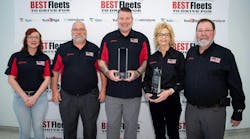A pair of recent court cases, with a third of a billion dollars or so on the line, should serve to remind carriers to review their driver pay models—especially if they have significant operations in California.
FedEx Corp. announced last week that the FedEx Ground unit had reached an agreement to settle independent contractor litigation for $228 million.
The class-action suit covers about 2,300 drivers who worked for the company between 2000 and 2007. Last August the Ninth Circuit Court of Appeals overturned a lower court and ruled that the drivers’ status as contractors failed the state’s “right-to-control” test.
FedEx disagreed with the ruling, and said that the contractor model had been upheld more than 100 times, including by the U.S. Court of Appeals for the D.C. Circuit. And FedEx began using a new contractor model closely aligned with those decisions in 2011.
“FedEx Ground faced a unique challenge in defending this case given the decision of the Ninth Circuit Court of Appeals last summer,” said Christine P. Richards, executive vice president and general counsel of FedEx Corp. “This settlement resolves claims dating back to 2000 that concern a model FedEx Ground no longer operates.”The case is pending in the U.S. District Court for the Northern District of California, and the settlement is subject to court approval.
Similarly, a federal judge in San Francisco recently ruled that the driver pay policies of Wal-Mart Stores Inc. violate California wage law by failing to pay drivers “at least minimum wage for all the time they work.” Attorneys representing drivers in the class action estimate back pay, interest and penalties could add up to more than $100 million.
The decision cites unpaid tasks as specified in Wal-Mart’s pay policy manual, but the judge the wrote that a “piece-rate formula that does not compensate directly for all time worked does not comply with California Labor Codes, even if, averaged out, it would pay at least minimum wage for all hours worked.”
Wal-Mart argued, however, that activities like inspections, fueling, washing, weighing, and paperwork are subsumed within other activities for which drivers are paid.
Another key issue was whether drivers were adequately paid during layovers. Wal-Mart did indeed pay $42 for the required 10-hour layover period if it’s taken in the cab. But because the pay policy restricted the location of the layover to the cab and excluded the driver’s residence, Wal-Mart was exercising “a high level of control,” and the drivers therefore must be paid at least minimum wage for that time, the court said.
Wal-Mart disagrees with the decision, according to a company statement, and points out that its drivers are among the best paid in the industry, earning on average between $80,000 and $100,000 per year.
In other cases in the past year, the Ninth Circuit ruled that drivers for Penske Logistics were entitled to mandatory, paid breaks under California law, despite a lower court’s ruling that trucking operations were exempt under federal law.
“We believe the federal district court correctly determined that California’s meal and rest break rules as applied to motor carriers were preempted by the [Federal Aviation Administration Authorization Act of 1994],” said Penske’s Senior VP and General Counsel Michael Duff.
Penske has appealed that decision to the U.S. Supreme Court.
And Hub Group last fall reported that, even though its drayage drivers in California were properly classified as independent contractors, they would be converted to company employees. Noting that lawsuits are “expensive, time-consuming and could interrupt our business operations,” the company also reported it had made offers to settle lawsuits against subsidiary Comtrak Logistics, now known as Hub Group Trucking.
“We did this because there was a fair amount of uncertainty in the legal climate in the state,” Hub Group Vice Chairman, President and COO Mark Yeager said at an analyst meeting at the time. “California’s a unique situation for a lot of reasons, and it’s particularly unfriendly towards this distinction between owner-operators and company drivers.”
What’s a trucking company to do?
Get good legal counsel, advises the California Trucking Assn. To that end, the nation’s largest statewide trucking organization and two of the country’s top law firms this spring formed the Labor Law Consortium “to educate the industry on California’s complex labor laws, address best management practices, and promote better understanding of labor agency and private entity standards.”




